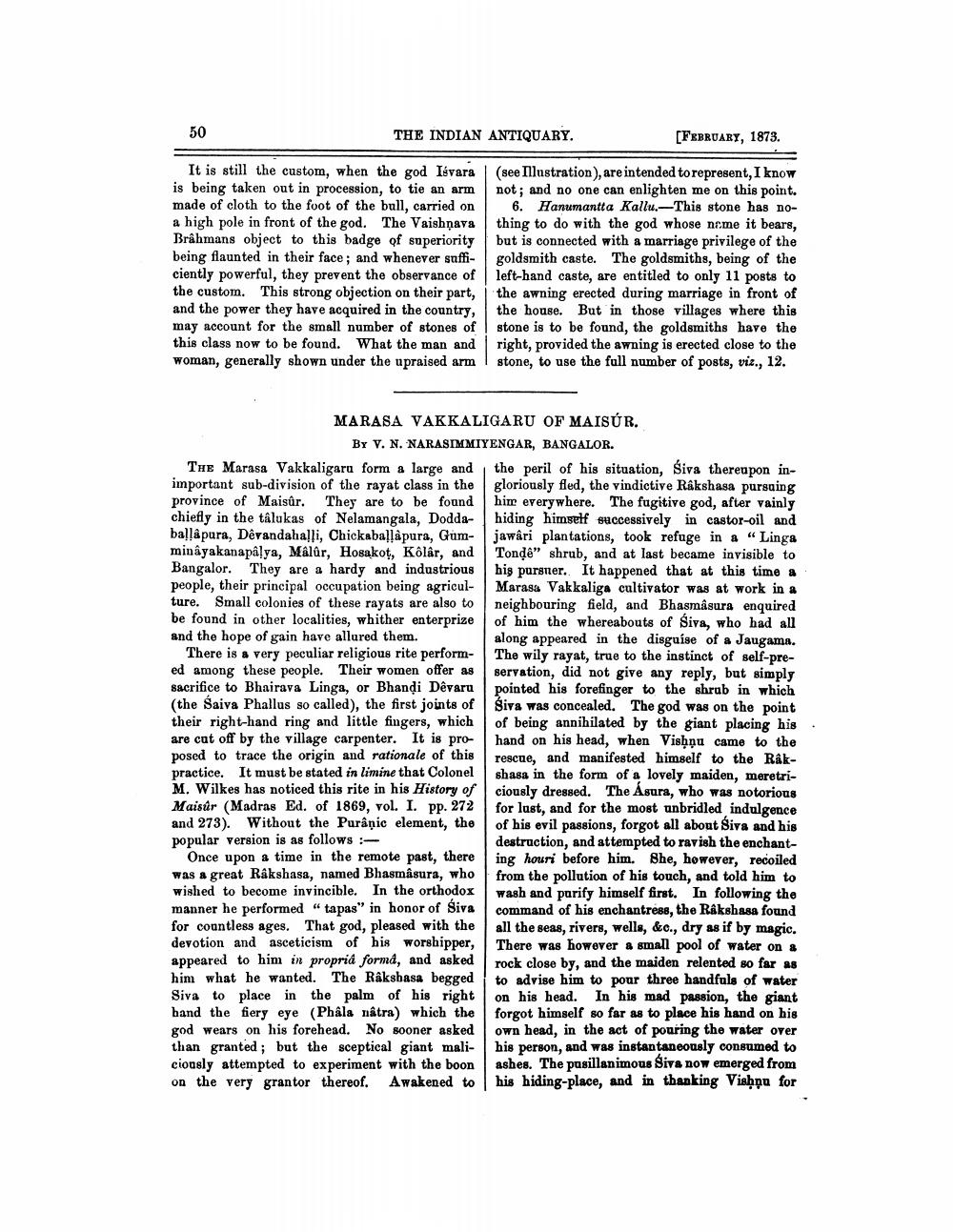________________
50
THE INDIAN ANTIQUARY.
It is still the custom, when the god Iévara is being taken out in procession, to tie an arm made of cloth to the foot of the bull, carried on a high pole in front of the god. The Vaishnava Brahmans object to this badge of superiority being flaunted in their face; and whenever sufficiently powerful, they prevent the observance of the custom. This strong objection on their part, and the power they have acquired in the country, may account for the small number of stones of this class now to be found. What the man and woman, generally shown under the upraised arm
MARASA VAKKALIGARU OF MAISÚR.
BY V. N. NARASIMMIYENGAR, BANGALOR.
THE Marasa Vakkaligaru form a large and important sub-division of the rayat class in the province of Maisûr. They are to be found chiefly in the tâlukas of Nelamangala, Doddaballapura, Dêvandahalli, Chickaballapura, Gumminayakanapalya, Mâlûr, Hosakot, Kôlâr, and Bangalor. They are a hardy and industrious people, their principal occupation being agriculture. Small colonies of these rayats are also to be found in other localities, whither enterprize and the hope of gain have allured them.
There is a very peculiar religious rite performed among these people. Their women offer as sacrifice to Bhairava Linga, or Bhandi Dêvaru (the Saiva Phallus so called), the first joints of their right-hand ring and little fingers, which are cut off by the village carpenter. It is proposed to trace the origin and rationale of this practice. It must be stated in limine that Colonel M. Wilkes has noticed this rite in his History of Maisûr (Madras Ed. of 1869, vol. I. pp. 272 and 273). Without the Purânic element, the popular version is as follows:
[FEBRUARY, 1873.
(see Illustration), are intended to represent, I know not; and no one can enlighten me on this point. 6. Hanumantta Kallu.-This stone has nothing to do with the god whose name it bears, but is connected with a marriage privilege of the goldsmith caste. The goldsmiths, being of the left-hand caste, are entitled to only 11 posts to the awning erected during marriage in front of the house. But in those villages where this stone is to be found, the goldsmiths have the right, provided the awning is erected close to the stone, to use the full number of posts, viz., 12.
Once upon a time in the remote past, there was a great Rakshasa, named Bhasmâsura, who wished to become invincible. In the orthodox manner he performed "tapas" in honor of Siva for countless ages. That god, pleased with the devotion and asceticism of his worshipper, appeared to him in propria forma, and asked him what he wanted. The Râkshasa begged Siva to place in the palm of his right hand the fiery eye (Phâla nâtra) which the god wears on his forehead. No sooner asked than granted; but the sceptical giant maliciously attempted to experiment with the boon on the very grantor thereof. Awakened to
the peril of his situation, Śiva thereupon ingloriously fled, the vindictive Râkshasa pursuing him everywhere. The fugitive god, after vainly hiding himself successively in castor-oil and jawâri plantations, took refuge in a "Linga Tondê" shrub, and at last became invisible to his pursuer. It happened that at this time a Marasa Vakkaliga cultivator was at work in a neighbouring field, and Bhasmâsura enquired of him the whereabouts of Śiva, who had all along appeared in the disguise of a Jaugama. The wily rayat, true to the instinct of self-preservation, did not give any reply, but simply pointed his forefinger to the shrub in which Siva was concealed. The god was on the point of being annihilated by the giant placing his hand on his head, when Vishnu came to the rescue, and manifested himself to the Râkshasa in the form of a lovely maiden, meretriciously dressed. The Asura, who was notorious for lust, and for the most unbridled indulgence of his evil passions, forgot all about Siva and his destruction, and attempted to ravish the enchanting houri before him. She, however, recoiled from the pollution of his touch, and told him to wash and purify himself first. In following the command of his enchantress, the Rakshasa found all the seas, rivers, wells, &c., dry as if by magic. There was however a small pool of water on a rock close by, and the maiden relented so far as to advise him to pour three handfuls of water on his head. In his mad passion, the giant forgot himself so far as to place his hand on his own head, in the act of pouring the water over his person, and was instantaneously consumed to ashes. The pusillanimous Siva now emerged from his hiding-place, and in thanking Vishnu for




